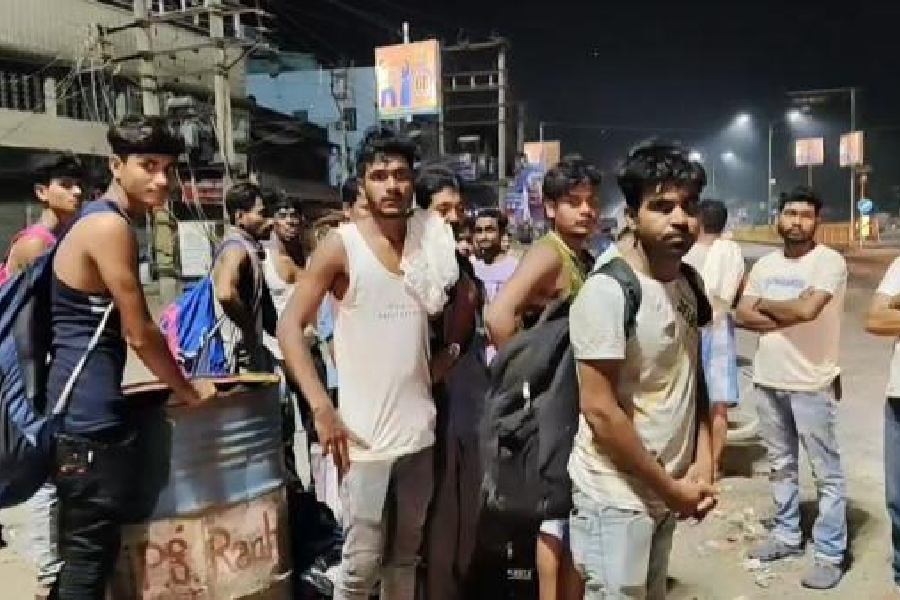The fallout of the Samserganj riots reached BJP-ruled Odisha and Uttar Pradesh on Monday when around 70 migrant labourers of the minority community from Murshidabad and Malda were allegedly assaulted and sent home when they reached those states to resume work.
Some 50 workers from Murshidabad had left for Keonjhar, Odisha, on Sunday, after their Eid break. They had to return home late Monday night in the same bus arranged by a labour contractor after being attacked allegedly by Hindutva activists who accused them of attacking a particular community in riot-hit Murshidabad.
Similarly, 24 migrant workers from Sujapur in Malda, who had been working in a garments factory in Jamalpur in Uttar Pradesh, were also allegedly beaten up and forced back.
The violence, which erupted over protests against the amended waqf law, had spread in pockets of Murshidabad, leaving three dead and damaging homes and property.
The “forced returns” have sparked fear among migrant workers from Murshidabad and Malda, many of whom were now worried about their survival.
On Monday, a Special Investigating Team (SIT) formed by the Bengal government arrested 12 migrant labourers from Jharsuguda in Odisha for their alleged role in the Murshidabad riots.
However, these migrant workers who were attacked and forced to return home, claimed they were not involved in violence but were paying the price of perception.
Momin Miyan, a labour contractor from Suti, who had arranged the Odisha-bound trip, said: “We just came home for a small break which coincided with the anti-waqf Act protests. We didn’t take part in it.”
Momin, who has been recruiting labourers for 12 years, said he had arranged a bus for workers to Keonjhar as usual. “Around 5.30am on Monday, a group of youths with Bajrang Dal flags stopped our bus at Jashipur More in Mayurbhanj. We were dragged out and beaten up.... They accused us of attacking their community. They warned us that the bus would be set on fire if we didn’t leave,” said Momin.
One of the 24 migrant workers from Sujapur in Malda who had been working in Jamalpur, Uttar Pradesh, for seven years, said a group of youths with saffron flags in their hands attacked them when they were working. “They accused us of attacking a community and asked us to leave, saying we would not be allowed to work there. Some of us were beaten up severely,” he said.
Monirul Khan of Sujapur, who returned from UP, said when they went to the police, they were detained and were released “only after paying a bribe of ₹30,000”.
"We have been working in UP for seven years. There was no problem earlier. But the scenario changed after the Murshidabad violence. Now it has become a question of our survival since we are not feeling secure to return there,” he said.
When the Sujapur workers were detained at Jamalpur Kotwali police station, Fatema Khatun, wife of migrant worker Shariful Khan, lodged a complaint with the Kaliachak police in Malda. The issue was taken up by the Migrant Workers’ Unity Forum. Its general secretary, Asif Farooq, wrote to Union home minister Amit Shah, urging him to ensure the safety and rights of migrant workers across states.
Jangipur SDO Ekam J. Singh professed ignorance. “If I get any complaint, I will report it to the state government,” he said.
The CPM said that TMC MP Abu Taher’s comment about the role of migrant workers in the riots was also to blame. “Abu Taher’s comment was amplified by BJP leader Tarunjyoti Tewari on social media. Within hours, attacks were unleashed in Odisha and UP. The Centre has also abrogated its responsibility to protect migrant workers...,” said CPM state secretary Md Salim and added that his party units in the two states were alerted to help Bengal workers.
Samirul Islam, chairman of West Bengal Migrant Workers’ Welfare Board and TMC’s Rajya Sabha MP, blamed the BJP. “Such attacks on migrant workers are not new in BJP-ruled states. Wherever they find Bengali-speaking Muslim migrant workers, they always find an issue to torture them,” he said.
Samik Bhattacharya, the BJP Rajya Sabha MP, argued that such incidents were the result of suspicion after states like Tamil Nadu found many Bengali-speaking people with fake Indian documents, who are Bangladeshi infiltrators. He pointed out that Tamil Nadu was not a BJP-ruled state.
"Tamil Nadu government, which is not run by the BJP, was the first to conduct a combing operation and discovered many such migrant workers with fake identities. After that, they stopped allowing Bengali migrant workers to work in their state. The allegations that came from other states are likely to be the result of such suspicion," said Bhattacharya.










